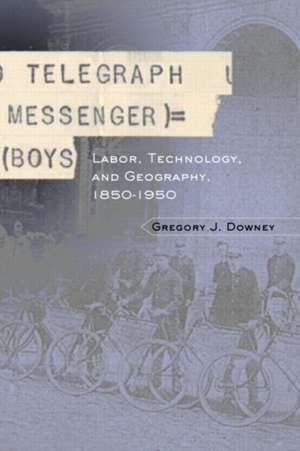Telegraph Messenger Boys: Labor, Communication and Technology, 1850-1950
Autor Gregory J. Downeyen Limba Engleză Paperback – 15 mai 2002
| Toate formatele și edițiile | Preț | Express |
|---|---|---|
| Paperback (1) | 368.51 lei 6-8 săpt. | |
| Taylor & Francis – 15 mai 2002 | 368.51 lei 6-8 săpt. | |
| Hardback (1) | 1115.69 lei 6-8 săpt. | |
| Taylor & Francis – 15 mai 2002 | 1115.69 lei 6-8 săpt. |
Preț: 368.51 lei
Nou
Puncte Express: 553
Preț estimativ în valută:
70.52€ • 73.81$ • 58.69£
70.52€ • 73.81$ • 58.69£
Carte tipărită la comandă
Livrare economică 01-15 aprilie
Preluare comenzi: 021 569.72.76
Specificații
ISBN-13: 9780415931090
ISBN-10: 0415931096
Pagini: 256
Ilustrații: 30 color images
Dimensiuni: 152 x 229 x 18 mm
Greutate: 0.42 kg
Ediția:New.
Editura: Taylor & Francis
Colecția Routledge
Locul publicării:Oxford, United Kingdom
ISBN-10: 0415931096
Pagini: 256
Ilustrații: 30 color images
Dimensiuni: 152 x 229 x 18 mm
Greutate: 0.42 kg
Ediția:New.
Editura: Taylor & Francis
Colecția Routledge
Locul publicării:Oxford, United Kingdom
Recenzii
"This meticulously researched study reveals a hitherto neglected aspect of the geography of information technologies: the labor necessary to the construction of space-time. The book provides a fascinating glimpse into the lives of Telegraph Messenger boys, and how they were shaped by, and shaped, corporate struggles surrounding the evolution of the telegraph, norms of age and gender, urban morphologies, and labor struggles. By demonstrating that their work was crucial to the realization of telecommunications in the twentieth century, Downey points to the importance of software engineers, line operators, delivery services and couriers in the twenty-first century.-Eric Sheppard, Professor of Geography, University of Minnesota."
"Drawing upon the techniques of history of science and contemporary human geography, Downey tells an amazing story of how a hitherto neglected labor force of mere boys pinned together the communication network of American cities for the best part of a century. This is interdisciplinary scholarship at its very best and pioneers an approach to understanding communication networks that has deep relevance to contemporary conditions.-David Harvey, Distinguished Professor of Anthropology, City University of New York."
"...this book could attract a broad readership. It would certainly become a must-read for graduate students and historians in the variety of fields on which it touches.[Downey's] analysis is original and his framework creative."-Susan Porter Benson, author of Counter Cultures: Saleswomen, Managers, and Customers in American Department Stores, 1890-1940."
"'.this book could attract a broad readership. It would certainly become a must-read for graduate students and historians in the variety of fields on which it touches.[Downey's] analysis is original and his framework creative."-Susan Porter Benson, author of Counter Cultures: Saleswomen, Managers, and Customers in American Department Stores, 1890-1940."
"Telegraph Messenger Boys opens a scholarly window onto a little-explored world: not just that of the teenaged information workers of an earlier era, but that of the human side of any technological revolution. It suggests a rich vein of investigation into our own information age -Paul A. Soukup, S.J Santa Clara University."
"This is a pioneering and insightful study - and a model of interdiscinplinary scholarship - that deserves a wide readership." -- American Historical Review
"Telegraph Messenger Boys opens a scholarly window onto a little-explored world: not just that of the teenaged information workers of an earlier era, but that of the human side of any technological revolution. It suggests a rich vein of investigation into our own information age." -- -Paul A. Soukup, S.J Santa Clara University
"Drawing upon the techniques of history of science and contemporary human geography, Downey tells an amazing story of how a hitherto neglected labor force of mere boys pinned together the communication network of American cities for the best part of a century. This is interdisciplinary scholarship at its very best and pioneers an approach to understanding communication networks that has deep relevance to contemporary conditions." -- -David Harvey, Distinguished Professor of Anthropology, City University of New York
"This meticulously researched study reveals a hitherto neglected aspect of the geography of information technologies: the labor necessary to the construction of space-time. The book provides a fascinating glimpse into the lives of Telegraph Messenger boys, and how they were shaped by, and shaped, corporate struggles surrounding the evolution of the telegraph, norms of age and gender, urban morphologies, and labor struggles. By demonstrating that their work was crucial to the realization of telecommunications in the twentieth century, Downey points to the importance of software engineers, line operators, delivery services and couriers in the twenty-first century." -- -Eric Sheppard, Professor of Geography, University of Minnesota
"This book could attract a broad readership. It would certainly become a must-read for graduate students and historians in the variety of fields on which it touches.[Downey's] analysis is original and his framework creative." -- -Susan Porter Benson, author of Counter Cultures: Saleswomen, Managers, and Customers in American Department Stores, 1890-1940
"Drawn on a variety of official and corporate sources, the study combines aspects of history and geography with an assessment of labor practices." -- Communication Booknotes Quarterly, Vol 35:2
"Downey tells a coherent story of the rise and fall of the TMB, a difficult but successfully executed task.
This book is full of interesting facts and stories...
." -- Tomas Nonnenmacher, Department of Economics, Allegheny College; EH.NET
Telegraph Messenger Boys offers intriguing analytical approaches for labor historians and is a worthy contribution to communications history.
William S. Pretzer
Henry Ford Museum
Dearborn, Michigan
"Drawing upon the techniques of history of science and contemporary human geography, Downey tells an amazing story of how a hitherto neglected labor force of mere boys pinned together the communication network of American cities for the best part of a century. This is interdisciplinary scholarship at its very best and pioneers an approach to understanding communication networks that has deep relevance to contemporary conditions.-David Harvey, Distinguished Professor of Anthropology, City University of New York."
"...this book could attract a broad readership. It would certainly become a must-read for graduate students and historians in the variety of fields on which it touches.[Downey's] analysis is original and his framework creative."-Susan Porter Benson, author of Counter Cultures: Saleswomen, Managers, and Customers in American Department Stores, 1890-1940."
"'.this book could attract a broad readership. It would certainly become a must-read for graduate students and historians in the variety of fields on which it touches.[Downey's] analysis is original and his framework creative."-Susan Porter Benson, author of Counter Cultures: Saleswomen, Managers, and Customers in American Department Stores, 1890-1940."
"Telegraph Messenger Boys opens a scholarly window onto a little-explored world: not just that of the teenaged information workers of an earlier era, but that of the human side of any technological revolution. It suggests a rich vein of investigation into our own information age -Paul A. Soukup, S.J Santa Clara University."
"This is a pioneering and insightful study - and a model of interdiscinplinary scholarship - that deserves a wide readership." -- American Historical Review
"Telegraph Messenger Boys opens a scholarly window onto a little-explored world: not just that of the teenaged information workers of an earlier era, but that of the human side of any technological revolution. It suggests a rich vein of investigation into our own information age." -- -Paul A. Soukup, S.J Santa Clara University
"Drawing upon the techniques of history of science and contemporary human geography, Downey tells an amazing story of how a hitherto neglected labor force of mere boys pinned together the communication network of American cities for the best part of a century. This is interdisciplinary scholarship at its very best and pioneers an approach to understanding communication networks that has deep relevance to contemporary conditions." -- -David Harvey, Distinguished Professor of Anthropology, City University of New York
"This meticulously researched study reveals a hitherto neglected aspect of the geography of information technologies: the labor necessary to the construction of space-time. The book provides a fascinating glimpse into the lives of Telegraph Messenger boys, and how they were shaped by, and shaped, corporate struggles surrounding the evolution of the telegraph, norms of age and gender, urban morphologies, and labor struggles. By demonstrating that their work was crucial to the realization of telecommunications in the twentieth century, Downey points to the importance of software engineers, line operators, delivery services and couriers in the twenty-first century." -- -Eric Sheppard, Professor of Geography, University of Minnesota
"This book could attract a broad readership. It would certainly become a must-read for graduate students and historians in the variety of fields on which it touches.[Downey's] analysis is original and his framework creative." -- -Susan Porter Benson, author of Counter Cultures: Saleswomen, Managers, and Customers in American Department Stores, 1890-1940
"Drawn on a variety of official and corporate sources, the study combines aspects of history and geography with an assessment of labor practices." -- Communication Booknotes Quarterly, Vol 35:2
"Downey tells a coherent story of the rise and fall of the TMB, a difficult but successfully executed task.
This book is full of interesting facts and stories...
." -- Tomas Nonnenmacher, Department of Economics, Allegheny College; EH.NET
Telegraph Messenger Boys offers intriguing analytical approaches for labor historians and is a worthy contribution to communications history.
William S. Pretzer
Henry Ford Museum
Dearborn, Michigan
Cuprins
Acknowledgements 1. Why Telegraph Messenger Boys? 2. Western Union and the Inner-City Messengers 3. American District Telegraph and the Intra-City Messengers 4. The Spaces of Messenger Discipline 5. The Message and the Messenger 6. The Limits of Gender, Class and Age 7. The First Information Internetwork 8. They Myths of Education 9. From Union Joke to Union Man 10. The Telegram is Dead; Long Live the Messenger














